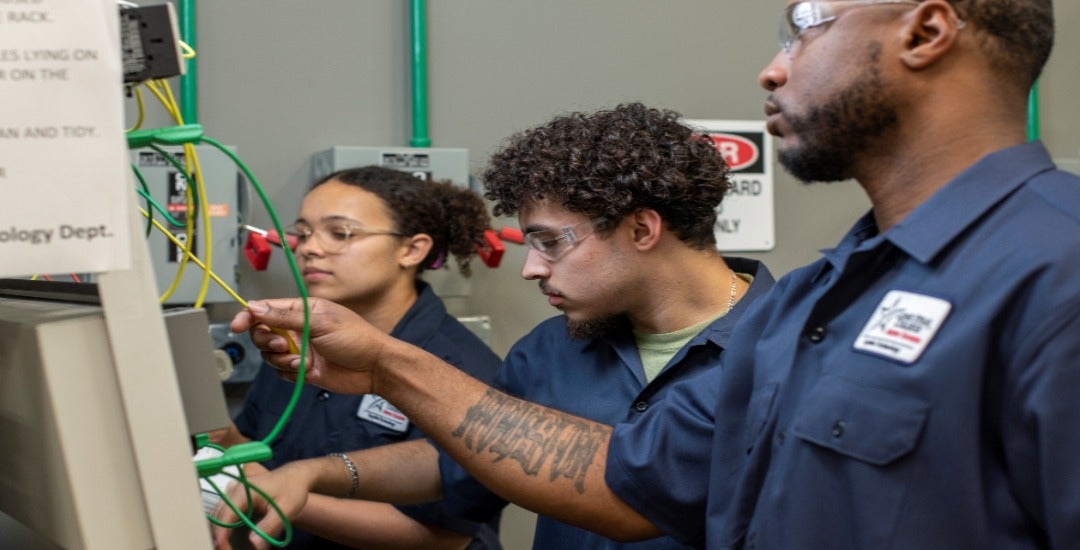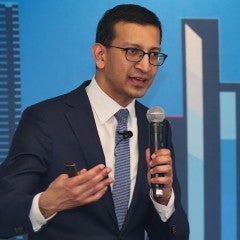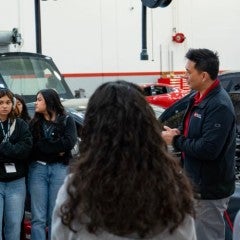Hundreds of thousands of Houstonians foresee jumping to a new career soon — and local institutions have work to do in helping people taking the leap.
In a new survey by the Kinder Institute’s Houston Population Research Center, about 18% of respondents who are either working or looking for work said a career change is very or extremely likely over the next five years. At that rate, about a half-million people across Harris, Fort Bend and Montgomery counties would switch careers during that time.
“There’s a healthy market of Houstonians who want to change careers, and these numbers mirror trends nationally,” said Kinder Institute research analyst Dylan Simburger, one of the co-authors of the research snapshot.
“The key is investing in proven programs that help people translate intent into action, whether through short-term credentials, apprenticeships or targeted career navigation supports that connect residents to growing industries.”
While the region’s academic and employment-focused institutions can help prospects get a foot in the door to high-demand fields, local workforce development leaders said stronger alignment is needed to ensure Houstonians secure stable, good-paying jobs in new careers.
“We need more collaboration,” said Rommell Williams, the Houston Area Urban League’s senior director of workforce development and training. “That's the best way that we can help. The foundation is there, but it needs to be facilitated on a larger scale.”
‘Need more employers at the table’
Workers looking to swap careers often face multiple barriers, including a gap in skills, financial constraints and uncertainty about which path to pursue.
Williams said local schools and nonprofits can help overcome these challenges by getting more feedback from employers and helping them understand employees’ skills.
He added that organizations like the Houston Area Urban League — which provided over 1,700 workforce services such as career coaching and upskilling to clients last year at no cost — would benefit from a better understanding of what prospective employers want from candidates.
“In the past, what we have done is we have provided training, hoping that the employers will hire those individuals,” Williams said. “We’re asking for more employer input as we design our training programs. We want to know what the employer needs are.”
In turn, Williams urges employers to give skills and credentials more weight than college degrees when hiring new employees. In 2022, the Burning Glass Institute, a national nonprofit research organization, estimated 15 million-plus job postings nationally required prospective hires to have a college degree, even though the jobs were considered “middle-skill” positions that don’t necessitate one.
“There's so many middle-skill jobs that really help this city and this state run that do not require a bachelor's degree or higher,” Williams said. “But a lot of employers are still hiring based on that criteria. To accommodate the number of people that are projected to change careers in the next five years, we need more employers at the table.”
Assisting the transition
While local leaders acknowledge much work needs to be done to help Houstonians change careers and climb the economic ladder, there’s momentum across the region.
Over the past few years, state lawmakers have increasingly incentivized community colleges to provide degree and credential programs in high-demand fields, moves that likely will help more adults swap careers.
Improving workforce development programs, aligning high-need skills with educational pathways and bringing more employers into the training fold were frequently discussed last month at the region’s first Economic Mobility Summit. About 150 business, philanthropic, education and civic leaders attended the event, which was designed to spur regionwide action on economic mobility.
On Wednesday, Houston Endowment announced a $5 million investment in workforce readiness. Nine community colleges in the region will each receive $500,000 to develop strategies for helping more students earn degrees and “credentials of value.”
Megan Mariveles, Lone Star College’s acting senior associate vice chancellor for curriculum and instruction, said external funding sources like the Houston Endowment grant can help expand their efforts, which include a workforce education and corporate partnerships program.
“This kind of partnership is vital, and we wouldn’t be able to do what we do without it,” Mariveles said. “When you have about half a million people wanting to change careers, it’s very important that we have pathways of entry for any person who would want to earn a certificate or a degree. We have that all the way from students who want a GED to a credential in a specific trade (to) an associate degree or four-year degree.”
Mariveles also emphasized the importance of regional partnerships for creating workforce-oriented curriculum. She said that industry professionals advise Lone Star College’s workforce development curriculum, which is helping to steer students into high-demand careers like health sciences, energy, construction and manufacturing.
“The focus used to be on completion and students graduating,” Mariveles said. “Now, that has really transitioned to what success students are having beyond completion. When we go about developing our workforce programs that we’re going to offer the community, we have to do a really thorough job of looking at the local labor market data and making sure what we're offering is setting our students up for jobs.”




